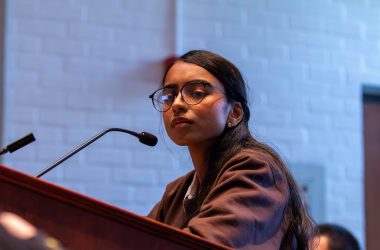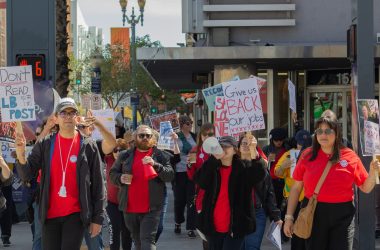By Garrett Troutman, Emmanuel Palacios, David Gonzales
Even after meals, Ryna Picar would be stooped over her laptop in the kitchen attending lectures and studying her coursework. Her Seal Beach apartment is the only place the Wi-Fi network would connect, and it didn’t always guarantee a reliable signal.
Working remotely can come with many distractions for students, such as work and a chaotic home life, and technology issues can add to an already discouraging year.
As Long Beach State’s first semester conducted primarily online comes to an end, students now understand what to expect and have adapted to the new academic landscape — a landscape where a stable internet connection is essential for nearly all educational activity.
“I live in an apartment with two other roommates where our Wi-Fi is pretty much nonexistent,”
Picar said. “So loading videos for lectures was really hard to do, or uploading things just wasn’t really working too well.”
A fourth-year student studying nutrition and dietetics, Picar is like a lot of students who found immediate accessibility issues when transitioning to remote learning.
To help with these concerns, CSULB offered students Wi-Fi hotspots and laptops to borrow for the fall semester in a joint effort by the Divisions of Student Affairs and IT. In July, the university proposed spending $2.65 million of federal stimulus money to expand student resources for remote learning.
Fourth-year environmental science and policy major Summer Kubba is just one of many students who have found difficulty completing assignments from home.
“My internet is unstable and therefore the audio cuts off a lot, so I miss some important material,” Kubba said. “I am afraid to ask in fear that we already covered it and the professor will blame me for not paying attention.”
Kubba’s fears are shared by students with similar connectivity problems. While missing pertinent information can already be harmful, students have said they’ve also experienced power outages during critical learning times.
“For most of my studies and classes, my professors have taken into consideration the hardships of COVID and how it is affecting everyone,” fourth-year geography major Cesar Flores said. “They have been doing their best to get the information out about each topic which has been very helpful.”
Unfortunately, not every professor will understand what students go through. Some instructors will be more lenient than others.
In addition to taking 16 units, Flores works full time at a restaurant and takes care of his younger siblings.
Many students tend to make use of university resources such as on-campus Wi-Fi, the library and computer lab, though these are unavailable this fall with the majority of classes being held remotely. As of October, the university has distributed over 1,500 laptops and 3,000 Wi-Fi hotspots equipped with unlimited data for those who no longer have access to these resources, according to Min Yao, vice president and chief information officer of IT.
Struggling to maintain a decent signal in her apartment, Picar said she would frequently visit local coffee shops to find Wi-Fi access. That is, until coronavirus-imposed regulations limited indoor seating for extended periods of time, causing Picar to decide to take advantage of the university’s loaner hotspot.
“[The hotspot] has been really great actually,” Picar said. “It is pretty fast, so I don’t have any problems uploading anything. It is a lot faster than your average Wi-Fi, surprisingly.”
Picar said she no longer needs to pace her room hoping for a signal. With mobile Wi-Fi access, she now goes outside to local parks and even the beach to do her schoolwork. Having remote accessibility has also enabled her to continue her studies while on the road visiting her family in Las Vegas.
However, some students have not experienced the same connectivity from the school-provided hotspots. Monica Vigil, a fourth-year journalism major, said she needed stronger Wi-Fi after moving back in with family where she had to share the connection with her brother and parents.
“I appreciate that they’re giving out hotspots for people that don’t have Wi-Fi at all but at the same time, in my experience, I’m better off just sharing my Wi-Fi than using the hotspot,” Vigil said. “It was not good quality. The video was lagging a lot, the audio would come in and out, so I ended up just getting off the hotspot and back onto the Wi-Fi.”
Students interested in loaning a laptop or hotspot from the university can do so by filling out an online form and can receive their devices at Brotman Hall at an agreed-upon time.
As the semester moved along, the Technology Help Desk announced in October that students in possession of loaned devices are permitted to keep them throughout winter break and the upcoming spring semester. New students and incoming freshmen will receive more information during December’s virtual SOAR workshop.
As of now, a four-week winter session will be offered fully online beginning Jan. 4, and the university plans to offer a two-week alternative mode of instruction session. The spring semester is scheduled to begin on Jan. 19, 2021.




